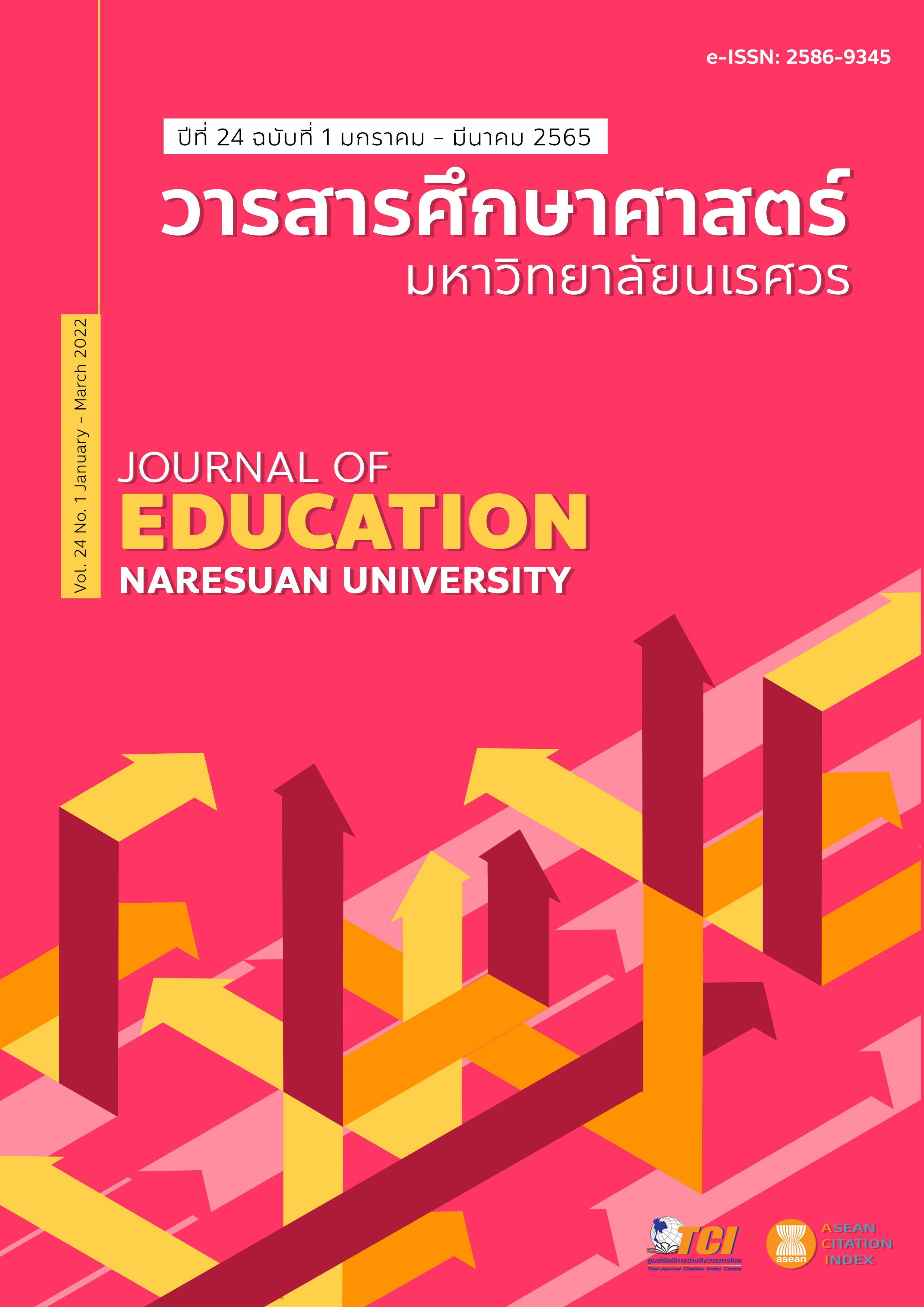THE DEVELOPMENT OF COMPETENCY ASSESSMENT TOOLS FOR NEW GENERATION SCHOOL ADMINISTRATOR: FUTURE INNOVATOR AND ENTREPRENEUR CREATOR การพัฒนาเครื่องมือประเมินสมรรถนะผู้บริหารโรงเรียนรุ่นใหม่ผู้สร้างนวัตกรและผู้ประกอบการในอนาคต
Main Article Content
Abstract
The objectives of this research were to 1) study the future innovator and entrepreneur components of students, 2) study the future innovator and entrepreneur creator components of school administrators, and 3) develop assessment tools for innovator and entrepreneur creator competencies for new generation school administrators. An explanatory sequential mixed-methods design was adopted in the following three phases. In the first phase, data were collected with 1,019 secondary school students through survey questionnaires. Fourteen experts were interviewed using semi-structured interviews in the second phase, and five experts were asked using feasibility and suitability evaluation forms in the third phase. Data were analyzed using the arithmetic mean, standard deviation, and exploratory factor analysis in the first phase; frequency and content analysis in the second phase; and arithmetic mean, power of discrimination, and reliability coefficients in the third phase. The results revealed that
1) students' future innovator and entrepreneur components consisted of nine components as follows: questioning, observing, obsessive note-taker, apophenia, pursue multiple streams, idea networking, experimenting, innovative entrepreneurial leadership, and social, environmental, and economic responsibility and sustainability (SEERS); 2) school administrators’ future innovator and entrepreneur creator components comprised three competency categories as follows: innovators and entrepreneur, learner development, and leading the innovative organization; and 3) assessment tools for innovator and entrepreneur creator competencies for the new generation school administrators consisted of three tools as follows: an assessment questionnaire for the school administrators’ future innovator and entrepreneur creator competencies, a simulation test for the Learner Development competencies, and a simulation test for the innovative organization leading competencies.
Article Details

This work is licensed under a Creative Commons Attribution-NonCommercial-NoDerivatives 4.0 International License.
The owner of the article does not copy or violate any of its copyright. If any copyright infringement occurs or prosecution, in any case, the Editorial Board is not involved in all the rights to the owner of the article to be performed.
References
Chaemchoy, S. (2020). The development of school management innovation for enhancing innovator competencies of secondary school students. Journal of Education Naresuan University, 22(2), 193-213. [in Thai]
Deal, T. E., & Peterson, K. D. (1999). Shaping school culture: The heart of leadership. San Francisco, CA: Jossey-Bass.
Dutta, S., Lanvin, B., & Wunsch-Vincent, S. (2019). The global innovation index. Ithaca, NY: Cornell, INSEAD, & WIPO.
Fontana, A., & Musa, S. (2017). The impact of entrepreneurial leadership on innovation management and its measurement validation. International Journal of Innovation Science, 9(1), 2-19.
Greenberg, D., McKone-Sweet, K., & Wilson, H. J. (2011). The new entrepreneurial leader: Developing leaders who shape social and economic opportunity. San Francisco, CA: Berrett-Koehler.
Gupta, V., MacMillan, I. C., & Surie, G. (2004). Entrepreneurial leadership: Developing and measuring a cross-cultural construct. Journal of Business Venturing, 19(2), 241-260. DOI:10.1016/s0883-9026(03)00040-5
Hallinger, P., & Murphy, J. F. (1986). The social context of effective schools. American Journal of Education, 94(3), 328-355.
Jueasrikul, S. (2017). IDE Center promotes "Innovation" as the future of modern entrepreneurs. Retrieved from https://themomentum.co/successful-feature-ide-center-invention-x-commercialization/
Kajornsilp, B. (2005). Research methodology. Bangkok: Physics Center Printing. [in Thai]
Kanjanawasee, S. (2013). Traditional test theory (7th ed.). Bangkok: Chulalongkorn University Press. [in Thai]
National Science and Technology Development Agency. (2016). Thailand 4.0 Blueprint: A model driving Thailand towards; Security, Prosperity, and Sustainability. Retrieved from https://waa.inter.nstda.or.th/stks/pub/2017/20171114-draeqa-blueprint.pdf
Ngigi, S., McCormick, D., & Kamau, P. (2018). Entrepreneurial leadership competencies in the 21st century: An empirical assessment. DBA Africa Management Review, 8(2), 1-17.
Nielsen, J. A. (2015). Assessment of innovation competency: A thematic analysis of upper secondary school teachers’ talk. The Journal of Educational Research, 108(4), 318-330.
Office of the Education Council. (2019). National Education Standards B.E. 2561. Bangkok: 21 Century Printing. [in Thai]
Rea, D. C., Carter, C. F., Wilkerson, J. R., Valesky, T. C., & Lang, W. S. (2011). Assessing ISLLC-based dispositions of educational leadership candidates. International Journal of Educational Leadership, 69(3), 1-15.
Thawesaengskulthai, N. (2019). Education for young innovators and innovative entrepreneurs. Nonthaburi: Wacharin P.P. Printing. [in Thai]
Zarefard, M., & Cho, S. E. (2018). Entrepreneurs' managerial competencies and innovative start-up intentions in university students: focus on mediating factors. International Journal of Entrepreneurship, 22(2), 1-22.


